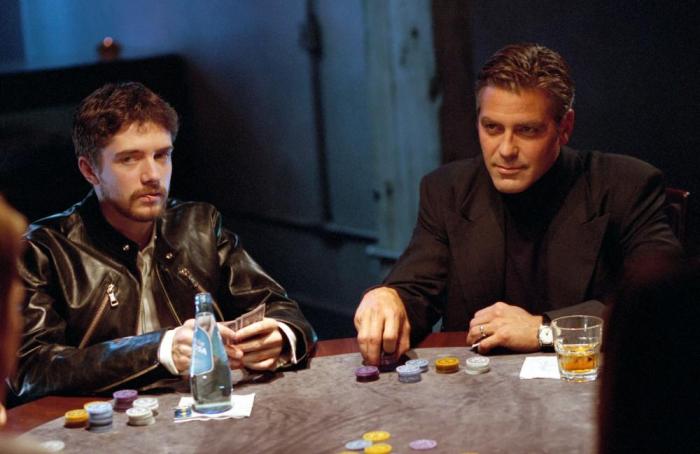Gambling in Pop Culture: Movies and TV Shows
FTC Statement: Reviewers are frequently provided by the publisher/production company with a copy of the material being reviewed.The opinions published are solely those of the respective reviewers and may not reflect the opinions of CriticalBlast.com or its management.
As an Amazon Associate, we earn from qualifying purchases. (This is a legal requirement, as apparently some sites advertise for Amazon for free. Yes, that's sarcasm.)

From the early days of Hollywood to the modern era of streaming platforms, gambling, including online platforms like mostbet pk, has been a recurring theme in popular culture. Whether it's high-stakes poker games in smoky backrooms or the glitz and glamour of a Las Vegas casino, gambling has provided the backdrop for countless memorable moments in movies and TV shows. In this exploration of "Gambling in Pop Culture," we'll delve into how this age-old vice has been portrayed on the big and small screens, examining the enduring allure and cautionary tales it offers.
The Allure of Gambling
Gambling has an inherent allure that captivates both storytellers and audiences. The thrill of risking it all, the potential for sudden wealth, and the psychological tension that accompanies every bet make gambling a rich source of drama and conflict. Whether a character is a seasoned professional or a novice trying their luck for the first time, the emotional rollercoaster of gambling provides a powerful backdrop for storytelling.
One of the most iconic portrayals of gambling's allure can be found in the 1974 classic film "The Gambler," starring James Caan. The film follows the life of a literature professor who is also a compulsive gambler. The character's descent into the world of high-stakes gambling serves as a cautionary tale, highlighting the destructive nature of addiction, but it also captures the seductive allure of the casino.
The element of risk is central to gambling's appeal, and this is brilliantly depicted in the world of professional poker, which has been a recurring theme in pop culture. Movies like "Rounders" and "Molly's Game" have showcased the intense mental warfare that takes place at the poker table. These films celebrate the skill, strategy, and psychology involved in the game, while also revealing the potential for financial ruin.
Casinos as Settings
Casinos, with their dazzling lights, opulent interiors, and a cacophony of sounds, have served as ideal settings for a wide range of stories. They represent a microcosm of life itself, where fortunes can change in an instant, and characters from all walks of life converge. The casino setting is particularly popular in heist films, where skilled thieves attempt to outwit security systems and steal vast sums of money.
A prime example of a heist film set in a casino is Steven Soderbergh's "Ocean's Eleven" (2001), which stars George Clooney, Brad Pitt, and an ensemble cast. The film's characters plan an elaborate heist targeting three of Las Vegas's most famous casinos. The luxurious setting of the casinos adds a layer of glamour to the film, making the heist both daring and visually captivating.
Similarly, the TV series "Breaking Bad" featured a memorable casino scene when Walter White, the chemistry teacher turned methamphetamine manufacturer, tries to launder his drug money through a casino. The tension in the casino scene mirrors the larger themes of the show, where the line between morality and criminality is continually blurred.
Addiction and Consequences
While gambling's allure is undeniable, pop culture also does not shy away from portraying the darker side of this vice. Countless movies and TV shows have explored the theme of addiction and the devastating consequences it can have on individuals and their families.
The 1988 film "Rain Man" portrays the relationship between a man named Charlie and his autistic brother Raymond, who possesses an extraordinary talent for counting cards in blackjack. Charlie exploits Raymond's abilities to win big in Las Vegas casinos, but as the story unfolds, the film delves into the destructive nature of addiction and the toll it takes on relationships.
In contrast, the TV series "Black Mirror" features an episode titled "Playtest," where a young man participates in a virtual reality horror game that taps into his deepest fears. The episode serves as a cautionary tale about the dangers of addiction to technology and the consequences of seeking thrills at any cost.
Comedic Takes on Gambling
Pop culture also offers a lighter side to gambling, often using humor to explore the absurdities of chance and luck. Comedic portrayals of gambling can be found in numerous films and TV shows, providing comic relief while still highlighting the unpredictability of gambling outcomes.
The 1998 cult classic film "The Big Lebowski" features a memorable bowling alley scene with a comically inept gang of German nihilists who also happen to be avid bowlers. The absurdity of the situation and the characters' exaggerated accents add humor to the film, making it a memorable comedic take on gambling-adjacent activities.
TV series like "The Simpsons" have also incorporated gambling-themed episodes, such as "$pringfield (Or, How I Learned to Stop Worrying and Love Legalized Gambling)." In this episode, the town of Springfield legalizes gambling, leading to a frenzy of casinos and betting. The humorous exploration of the townspeople's addiction to gambling provides a satirical commentary on the casino industry.
Conclusion
Gambling in pop culture has taken on many forms, from thrilling heists in glamorous casinos to cautionary tales of addiction and its consequences. It offers a rich tapestry of narratives that explore the allure, risks, and rewards of this age-old vice. Whether portrayed with dramatic intensity or comedic flair, gambling remains a captivating and enduring theme in movies and TV shows, reflecting the complexities of human nature and our fascination with chance. As long as gambling continues to enthrall and perplex, it will remain a prominent fixture in our cultural landscape, providing storytellers with an evergreen source of inspiration.


